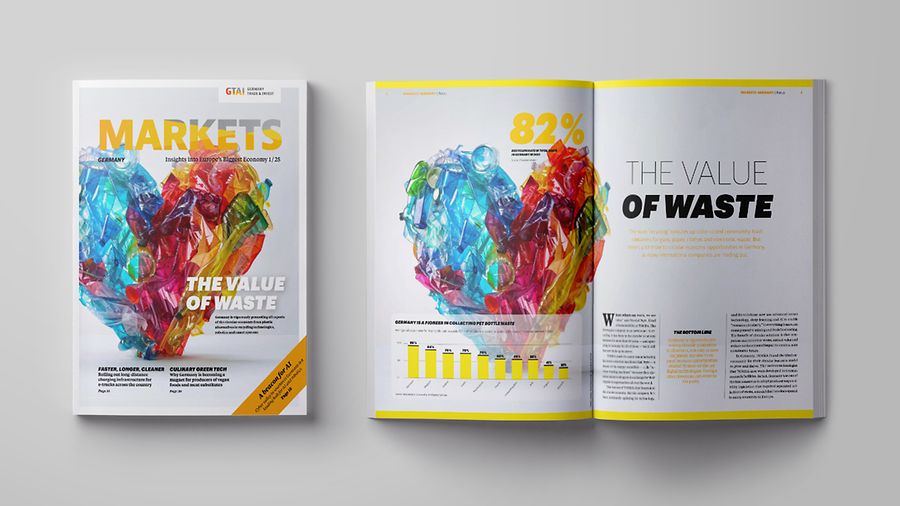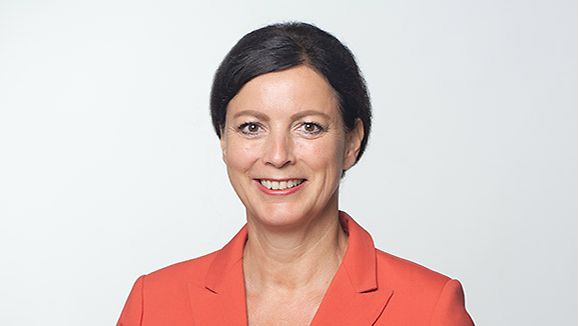
Markets Germany Magazine 1/25 | Circular Economy
Circular Synthetics Economy
The world needs sustainable synthetic materials, and Germany has the research expertise and well-developed manufacturing infrastructure to help companies create the building blocks of the future.
Mar 18, 2025
Synthetic materials are everywhere,” asserts Dr. Marcus Vater, Head of Scale-up and Pilot Testing at the Fraunhofer Institute for Applied Polymer Research (Fraunhofer IAP) at Germany’s renowned Fraunhofer Society, underlining the importance of his department’s work.
It is hard to argue with his logic. From straws to spacecrafts, food packaging to cutting-edge medical devices, plastics and other synthetic materials are present in almost every facet of modern life. Many things we take for granted would simply not exist without them. “The beauty of synthetic materials is that we can adjust their characteristics to fit our needs,” explains Vater. “We don’t have to settle for whatever nature provides, we can design them as we like.”
But their ubiquity has created one big problem: damage to the environment. “When a synthetic product reaches the end of its life and isn’t recycled, or returned to the production cycle, that’s a huge issue,” says Vater’s colleague Dr. Jens Balko, Head of the Technical Center for Biopolymers at the Fraunhofer IAP. “Every year millions of tons end up in the environment.”
The Bottom Line
International companies can exploit the growing German market for synthetic materials recycling.
Manufacturers have responded to the plastic waste challenge by setting ambitious targets. “European plastics producers are committed to making production climate-neutral by 2050, with a goal of 65 percent of materials coming from recycled and renewable sources,” says Alexander Kronimus, Managing Director of industry association Plastics Europe Germany. “Achieving these goals will require a mix of technologies.”

This article was published in issue 1-2025 of the Markets Germany Magazine. Read more articles of this issue here
Research bodies like the Fraunhofer Society, which is partially funded by the German government, put Germany at the forefront of this essential work. For example, one project has developed new types of polybutylene succinate (PBS) that are recyclable and biodegradable. The technology has already found an application in agriculture, where it is used to protect crops from weeds. Many more applications are ready for market entrance including bottles, cosmetic packaging and technical textiles.
The future of plastics
Another Fraunhofer program has developed a synthetic rubber for use in tires that loses significantly less mass and tread compared to natural rubber. The material is made using dandelions, reducing reliance on natural rubber trees and alleviating supply concerns. German company Continental, a giant of the tire industry, is among the firms to benefit from this research.
There is also the Fraunhofer Cluster of Excellence Circular Plastics Economy — a collaboration between the Fraunhofer Society’s various institutes that combines knowledge from across the spectrum of its research projects — that aims to help plastics manufacturers make their products more sustainable.
Jens Balko points to Germany’s well-integrated research structures as a major bonus for international companies looking to invest in applied R&D. “Universities have small laboratories, while industry uses huge plants. The Fraunhofer Society was founded to bridge the gap between basic research and industrial processes,” he says.
“We have plenty of international customers, including from leading industrial nations, where they don’t have structures like this in place,” Marcus Vater adds.
Kronimus also sees this setup as a major draw for recyclable synthetics cooperation. “Germany has real potential to become a powerhouse for the circular economy,” he says. “Its environment enables companies worldwide to collaborate with top researchers and advance sustainable developments in synthetic materials.”
A circular plastics ecosystem
Germany itself is one of the world’s major plastics manufacturers, and the biggest in Europe, accounting for more than 20 percent of the continent’s production. This gives inward investors the confidence that all the bases are covered in the circular economy.
“What sets Germany apart from other regions is its locally based, and complete plastics value chain — from production and processing to recycling and machinery manufacturing,” explains Kronimus. “This proximity, combined with Germany’s robust research landscape, creates ideal conditions for developing sustainable plastics.”
Many international firms are already taking advantage of Germany’s synthetics ecosystem. Finnish company UPM recently began operations at the world’s first biorefinery in Saxony-Anhalt. The plant, which was completed in late 2024 following an investment of some EUR 1.2 billion, produces biochemicals made from sustainable wood sources.
Germany Trade & Invest has established a task force to support international companies looking to set up shop at existing chemical and refinery locations in eastern Germany. “The region has a long history in the chemical industry. It offers an excellent environment for new applications, creating positive conditions in terms of infrastructure and a qualified workforce,” explains Verena Schüren, Director of GTAI’s Transformation Taskforce. “We are here to make sure companies can take advantage of these opportunities.”
UPM’s ambition is to “create a future beyond fossils.” With its pioneering research sector and strong synthetics manufacturing track record, Germany is already playing a leading role in building that future.


